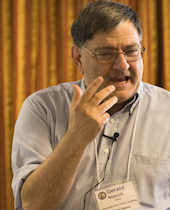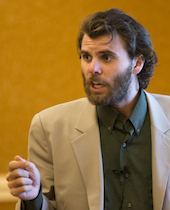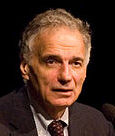| Together, the Center and Foundation for Critical Thinking have hosted critical thinking academies and conferences for almost 35 years. During that time we've played a key role in defining, structuring, assessing, improving, and advancing the principles and best practices of fairminded critical thought in education and in society. Our annual conference provides a unique opportunity for you to improve your understanding of critical thinking, as well as your ability to substantively foster it in instruction, and bring it into all aspects of your life. At this year's conference, we emphasize the importance of cultivating the public citizen, as we honor the thought and work of Ralph Nader through the Bertrand Russell Scholars Lecture and program. Accordingly, in additional to our usual sessions for educators, we offer sessions for all citizens, throughout the world, who are interested in improving their ability to reason through complex issues, as public citizens, and in all parts of life. Critical thinking is as essential to thinking like a skilled public citizen as it is to thinking like a skilled educator, administrator, psychologist, historian, scientist, doctor, parent, student…as it is to thinking well within any domain of human thought or through any important issue. The conference begins with two options for preconference sessions. The rest of the conference will consist of approximately 40 sessions offered over four days. When you register for the conference, you will choose your preconference and focal sessions for the main conference. On the third day of the conference you will choose from approximately 25 concurrent sessions. (The full concurrent session program will be available at the conference). Many of the sessions will be posted online in advance. All conference registrants are invited to the Bertrand Russell Scholars program with Ralph Nader. Seating in live or virtual ballroom will be based on date of registration. See registration page for details. Only registered delegates may attend the Nader lecture and conversation. Conference focal sessions are listed in the conference overview to your right. Focal session descriptions will be posted in the next week. All delegates are encouraged to register for the preconference. The two-day intensive preconference experience with our fellows is highly recommended, as it will help you internalize foundational understandings in critical thinking to be developed and contextualized throughout the conference. Throughout our work we emphasize the importance of fostering a substantive conception of critical thinking. Such a conception not only highlights the qualities of the educated person, but also implies the proper design of the educational process. It illuminates the importance of education to the cultivation of public citizens and the advancement of free societies. There are essential, minimal conditions for cultivating educated minds. These entail modes of instruction that foster development of the standards, abilities, and traits of the educated person. When students are taught using a substantive concept of education as the guide to the design of instruction, they learn to initiate, analyze, and evaluate their own thinking and the thinking of others (within all the content areas they study). Doing so, they come to act more reasonably and effectively in every part of life. They are able to do this because they have acquired intellectual tools and intellectual standards essential to sound reasoning, and to personal and professional judgement. Self-assessment becomes an integral part of their lives. They are able to master content in diverse disciplines. They become proficient readers, writers, speakers, and listeners. They use their learning to raise the quality of their lives and the lives of others. They become reasonable and fairminded persons capable of empathizing with views with which they disagree and disagreeing with views uncritically accepted by those around them. They are able to use their reasoning skills to contribute to their own emotional life, and to transform their desires and motivations accordingly. They come to think, feel, and act effectively and with integrity. All conference sessions are designed to converge on basic critical thinking principles, and to enrich a core concept of critical thinking with practical application to learning and to life. All sessions are intellectually engaging, with much writing, reading, and lively discussion among delegates. All participants are integrated into the learning process as we attempt to model and engage in the instructional processes we encourage in education across the world, at every level, in every field of study. For a richer explanation of core critical thinking concepts, see the Thinker's Guide Library (Click Here).
Main Conference Presenters
Dr. Richard Paul
Dr. Richard Paul is a distinguished leader in the international critical thinking movement. He is Founder and Senior Fellow of the Foundation for Critical Thinking and Director of Research at the Center for Critical Thinking; he has authored more than 200 articles and seven books on critical thinking. Dr. Paul has given hundreds of workshops on critical thinking and made a series of eight critical thinking video programs for PBS. He has been the recipient of numerous honors and awards, including Distinguished Philosopher (by the Council for Philosophical Studies, 1987), O.C. Tanner Lecturer in Humanities (by Utah State University, 1986), Lansdown Visiting Scholar (by the University of Victoria, 1987), and the Alfred Korsybski Memorial Lecturer (by the Institute for General Semantics, 1987). His views on critical thinking have been canvassed in the New York Times, Education Week, The Chronicle of Higher Education, American Teacher, Leadership, and Newsweek.
Dr. Linda Elder
Dr. Linda Elder is an educational psychologist and a prominent authority on critical thinking. She is President and Senior Fellow of the Foundation for Critical Thinking. Dr. Elder has taught psychology and critical thinking at the college level, and has given presentations to more than 20,000 educators. She has coauthored four books and twenty-one thinker's guides on critical thinking. Concerned with understanding and illuminating the relationship between thinking and affect, and the barriers to critical thinking, Dr. Elder has placed these issues at the center of her thinking and her work.
 Dr. Gerald Nosich Dr. Gerald Nosich Dr. Gerald Nosich is an authority on critical thinking and Senior Fellow of the Foundation for Critical Thinking; he has given more than 150 national and international workshops on the subject. He has worked with the U.S. Department of Education on a project for the National Assessment of Higher Order Thinking skills, has served as the Assistant Director of the Center for Critical Thinking, and has been featured as a Noted Scholar at the University of British Columbia. He is Professor of Philosophy at Buffalo State College in New York and the author of two books, including Learning to Think Things Through: A Guide to Critical Thinking Across the Curriculum.
 Dr. Rush Cosgrove Dr. Rush Cosgrove Dr. Rush Cosgrove is Assistant Director of Research and Historian at the Foundation for Critical Thinking and Research Fellow. He holds a PhD from the University of Cambridge, Darwin College. He holds Masters degrees from both the University of Oxford, New College and the University of Cambridge, Darwin College. He has conducted research on critical thinking and the Oxford Tutorial, and on the Paulian Framework for critical thinking as contextualized at a major U.S. research university. He conducts workshops in critical thinking for faculty and students, in English as well as Spanish.
|
| Choose one preconference and focal session for each section...
Preconference
(choose one):
Saturday & Sunday (July 26-27)
- Cultivating Critical Thinking in Teaching and Learning: the Foundations of Critical Thinking ... Dr. Richard Paul & Dr. Linda Elder
- Bringing Critical Thinking Concepts and Principles into the Heart of Socratic Dialogue ... Dr. Gerald Nosich
Conference Day One
(choose one focal session):
Monday (July 28) - Placing Critical Thinking at the Core of the Core of the College Curriculum ... Dr. Richard Paul & Dr. Linda Elder
- Cultivating the Public Citizen Through a Robust Conception of Critical Thinking in Education ... Dr. Rush Cosgrove
- Fostering Deep Understanding of Fundamental and Powerful Concepts in Instruction and in Daily Life ... Dr. Gerald Nosich
- For Returning Registrants: Socrates, Epictetus and Critical Thinking - Linking Transformative Ideas Throughout History ... Mr. Brian Barnes
Conference Day Two, Morning-
all conference registrants invited...
Tuesday (July 29) Bertrand Russell Distinguished
Scholars Lecture & Conversation
Russell Scholar: Ralph Nader

All Conference delegates are encouraged to actively participate in this session. Only those registered may attend.
| Conference Day Two, Afternoon
(choose one):
Tuesday (July 29) - Assessing Students' Critical Thinking... Dr. Gerald Nosich
- Emotional Intelligence: a Conceptual Model ... Dr. Richard Paul & Dr. Linda Elder
- Intellectual Virtues - Essential to the Public Citizen... Dr. Rush Cosgrove
- The Role of Close Reading and Substantive Writing in Education, in the Mind of the Public Citizen and Throughout Life ... Dr. Paul Bankes
Conference Day Three: Morning
Wednesday (July 30)
- Concurrent sessions - To be announced a few weeks prior to the conference.
Concurrent sessions are one hour in length. Most sessions are conducted by faculty and administrators who have been working with critical thinking concepts and principles for several years, bringing critical thinking into the individual classroom or across the curriculum. Conference Day Three: Afternoon
Wednesday (July 30) - What Current Research Reveals about the State of Critical Thinking in Education Today... Dr. Rush Cosgrove
- The Role of Essential Questions in Education and in Cultivating the Public Citizen... Dr. Gerald Nosich
- For Administrators: Key Ingredients of an Effective Professional Development Program in Critical Thinking... Dr. Linda Elder & Dr. Richard Paul
- What it Means to Be a Public Citizen: Exploring Ralph Nader's Philosophy and World View... Mr. Brian Barnes
Conference Day Four
Thursday morning (July 31) - Sociocentrism - a Primary Barrier to the Development of the Public Citizen... Dr. Linda Elder & Dr. Richard Paul
- Fostering Multilogical Thinking Across the Disciplines... Dr. Gerald Nosich
- Teaching Students to Give Feedback Using Intellectual Standards ... Dr. Rush Cosgrove
Berkeley, CA
| |